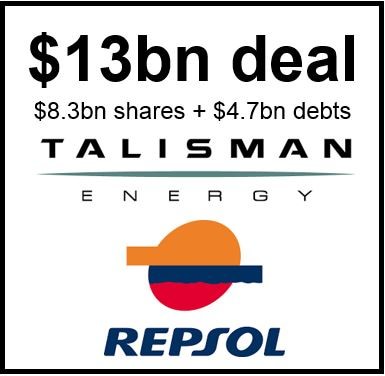Talisman Energy Inc. and Repsol S.A. have agreed on a $13 billion acquisition deal which includes Talisman’s current debt, the two companies announced on Tuesday.
Under the definitive agreement, Repsol will buy all of Talisman’s outstanding common shares for $8 (CS9.33) in cash. The purchase price is 75% higher than the 7-day weighted average share price and a 60% premium on its 30-day volume weighted average price.
Repsol will pay $8.3 billion for all Talisman shares, and take on $4.7 billion of debt.
Prior to completion of the deal, Talisman will be allowed to pay aggregate cash dividends of $0.18 per common share.
With oil prices tumbling by about 44% since June this year, oil producers such as Talisman have seen their share prices decline considerably, creating an ideal environment for companies on the acquisition trail.
With the market awash with bargains, analysts were surprised the Spanish oil giant paid such a high price for Talisman.
Analysts on both sides of the Atlantic believe Repsol should have waited longer, given that the price of oil is expected to continue falling well into 2015.
Chairman of Talisman’s Board of Directors, Chuck Williamson, said:
“This deal creates significant and immediate value for Talisman stakeholders. Importantly, the deal underscores Repsol’s strong belief in the high quality portfolio that Talisman has worked hard to develop. Repsol is a world-class operator with a solid track record and the financial capability to continue the development of these assets within their international portfolio.”
“I am proud of the company that our employees, past and present, have built and I believe this transaction represents new opportunities for them in Canada and around the world.”
Chairman of Repsol, Antonio Brufau, said:
“Our combination with Talisman allows us to align our highly complementary portfolios of upstream assets to create a truly global company well-positioned to grow production and reserves. Talisman has strong operational capability, a highly skilled work force and we look forward to leveraging their expertise as we partner to create a stronger, more profitable and competitive organization.”
When asked whether Repsol may need to sell its 30% stake in Gas Natural (GasNat), Mr. Brufau said “We don’t need to sell our stake in GasNat to do this deal. For us GasNat brings stability, dividends and optionality.”
For Repsol, the acquisition will fill a gap left by Argentina’s seizure of its subsidiary YPF two years ago. It will also reduce its reliance on high-risk oil producing nations such as Venezuela and Libya.

